Coronavirus: Londonderry woman's hospital bed plea over virus
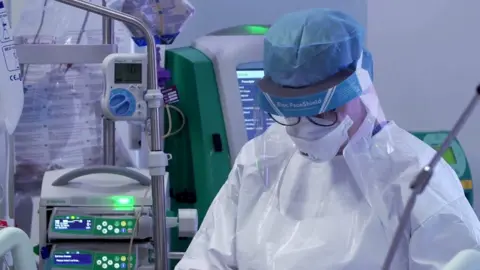 BBC
BBCA Londonderry woman has made an emotional plea from her hospital bed for the public to take Covid-19 seriously.
Sandra Kelly, 58, told BBC News NI she feared she would die and would never see her 85-year-old mother again.
It comes as cases of Covid-19 have dropped by 49% in the Derry and Strabane District Council area.
The figures show the drop in positive tests since local restrictions were introduced three weeks ago.
BBC News NI was invited into Altnagelvin Hospital in Derry on Monday to highlight the ongoing pressures the pandemic is having on all aspects of care.
The Department of Health in Northern Ireland reported nine further Covid-19 related deaths on Wednesday, bringing its total to 680.
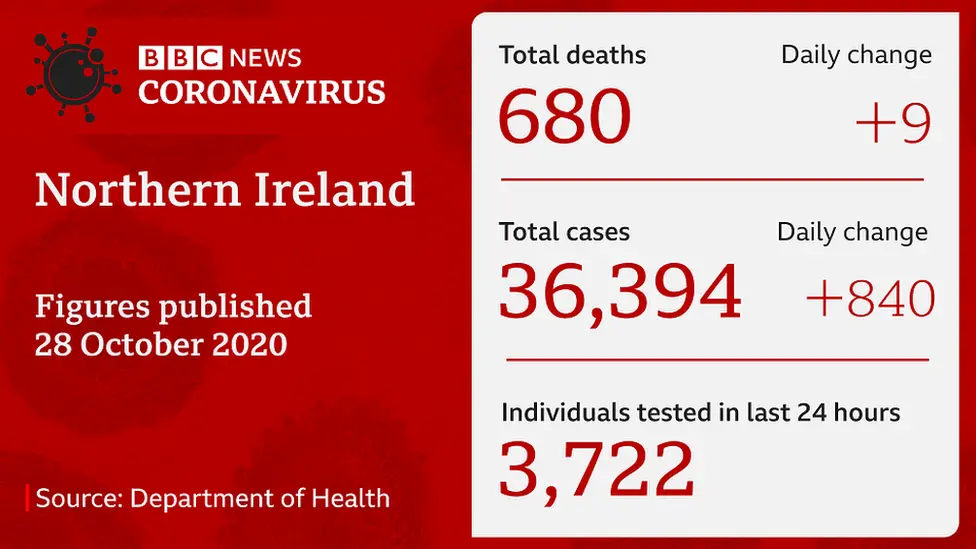
There were 840 further positive cases, with the total number of cases now 36,394.
Mrs Kelly told the BBC she was admitted to ward 21 - a specialist Covid recovery unit set up just a few weeks ago - and hooked up to a CPAP (continuous positive airway pressure) machine to help her breathe.
"You are aware that the doctors and nurses have a big battle fighting to save your life and you don't know if you are going to live or die," she said.
At first her symptoms were mild but, on day eight, she took a turn for the worse.
"Something took over my body and there was no control," she said.
"You just knew this was bad. You thought maybe you weren't going to make it.
"It was traumatic. I was thinking about my family, my husband, my children, my grandson.
"My mum is 86 and to have to leave my mum behind would have been difficult.
"I'm the only girl and her carer, I worried who would look after her.
"Thanks to the nursing staff - they were tremendous. They are the reason I'm here today."
Mrs Kelly issued a stark warning for people who continue to flout coronavirus restrictions.
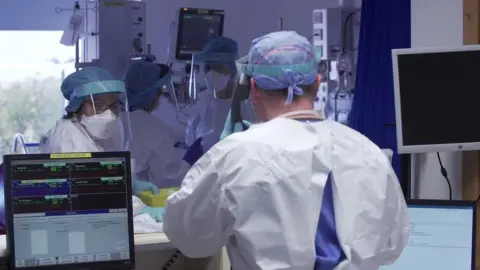
"Covid is real. It will come, it will get you," she said.
"You have to live by the guidelines and obey the rules and hopefully you will not end up where I ended up."
The scale of the difficulties in the hospital were laid bare at a bronze management meeting on Monday.
Dr Mark Gillespie, assistant director of acute services, said one of the most pressing problems was staff absences, with 514 people off sick that day.
There were 68 Covid-positive patients being treated in Altnagelvin, including seven in ICU.
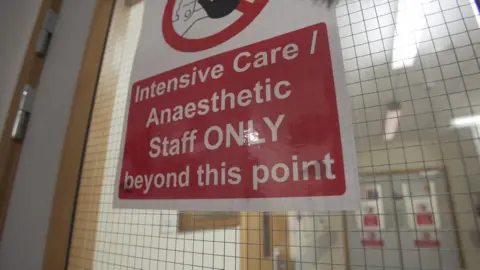
"Resources are minimal. There's still a fair degree of pressure," the meeting was told.
As well as coping with Covid cases, the meeting was told that, at that stage, 27 red flag surgical cancer cases were also going ahead.
Ward 21, which until recently had been an elective orthopaedic facility, was operating at full capacity with 20 patients seriously ill with coronavirus - up from 15 last week.
There were three deaths in the past week - all of them affecting the staff working the gruelling 12-hour shifts.
Nurse Laura Hegarty, 29, said she felt "exhausted, physically drained and emotional".
"It's a living nightmare," she said.
"Trying to look after staff, trying to look after patients and trying to look after yourself, but trying not to take it home, but trying not to let it affect your work as well.
"I just can't wait for it to be over."
The mother of two, whose wedding plans for June are in doubt because of the pandemic, said she fears bringing the virus back home but is determined to continue on the front line.
"I volunteered to come here. I volunteered in March and I volunteered again," she said.
"My aim as a nurse has never changed - it's not for the dramatic purposes, it's to look after people especially when they are really ill like this.
"In the four years that I have been a nurse this has been the most challenging few weeks of my life."


For one day we observed Altnagelvin Hospital's fight against the virus - just one 12-hour window into a pandemic which is now into its ninth month.
There was talk of staff burnout, post-traumatic stress disorder and coping with depression.
Almost like an Army coming back from a war, these hospital workers are feeling the impact of Covid.
And the battle isn't over yet.

She added: "We have had patients from their 20s right up to 90s. The patients in their 20s - some of them are just as sick as the elderly. It's not just affecting the elderly, like the public think.
"It's like something I've never seen before.
"I have been lucky enough not to have contracted the virus since March, but I know it's going to happen sooner or later.
"I just have to hope that following the hospital policy and the government guidelines that I'll keep myself, my patients and my family safe."
Meanwhile, standing outside the ward, Jim Kelly, whose mother Chrissie Kelly lost her battle against the virus last week, described how it had "consumed" her.
"It just happened so quick," he said. "We are trying to get over the shock of it.
"It was very, very hard to take in."
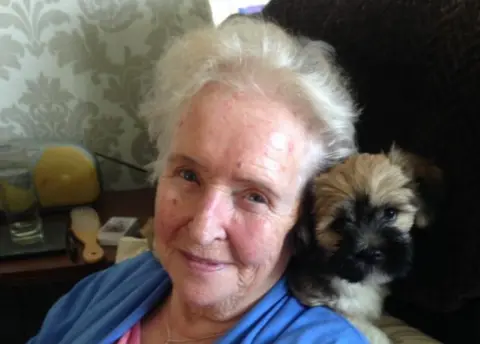 Kelly family
Kelly familyJim was the only one of Mrs Kelly's 11 children who could see her as she died.
"Unless it hits you personally you don't pay much attention to it, but when it hits home on a personal level it was very, very hard to take in."
Mr Kelly wanted to pay tribute to the staff - who he described as "angels" - working on ward 21.
BBC News NI was also given exclusive access to the intensive care unit where seven Covid patients were fighting for their lives.
Among those working round the clock is consultant Dr Manav Bhavsar, who praised the public for their efforts in recent weeks.
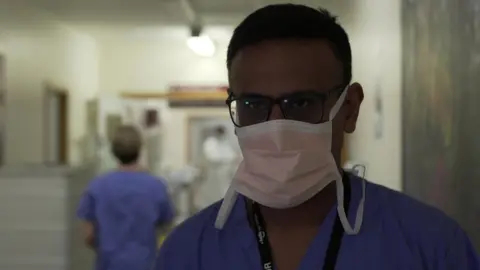
"First and foremost I would like to say thank you," he said.
"We are all in this together. If we are not in this together there are lives which will be lost.
"You can see that as soon as the lockdown happened the hospital admissions did come down. It does not mean we are out of the woods.
"We all say the same thing, but it is important that we maintain social distancing, we do wear our mask, we need to be really mindful of washing our hands.
"I don't think we have the option otherwise the system will be overrun.
"We all want to be hopeful - let's take each day, each week at a time."
- The BBC is making a donation to replace any PPE used during the visit.
